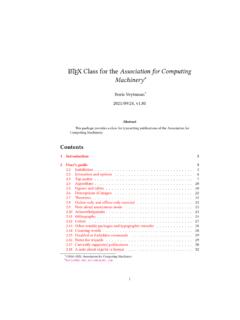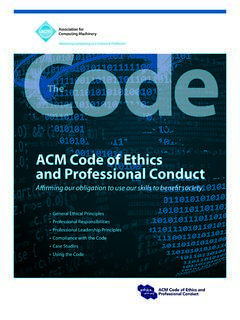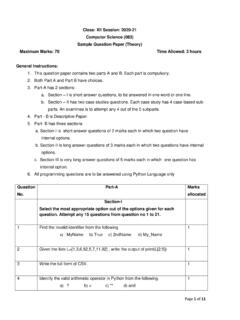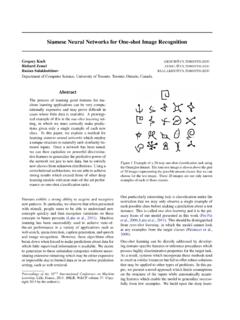Transcription of Computer Science Curricula 2013
1 Computer Science Curricula 2013 Curriculum Guidelines for Undergraduate Degree Programs in Computer ScienceDecember 20, 2013 The Joint Task Force on Computing CurriculaAssociation for Computing Machinery (ACM)IEEE Computer SocietyA Cooperative Project ofComputer Science Curricula 2013 Curriculum Guidelines for Undergraduate Degree Programs in Computer ScienceDecember 20, 2013 The Joint Task Force on Computing CurriculaAssociation for Computing Machinery (ACM)IEEE Computer SocietyComputer Science Curricula 2013 Copyright 2013 by ACM and rights and Reprint Permissions: Permission is granted to use these curriculum guide-lines for the development of educational materials and programs.
2 Other use requires specific permission. Permission requests should be addressed to: ACM Permissions Dept. at or to the IEEE Copyrights Manager at 978-1-4503-2309-3 DOI: Web link: Order Number: 999133 Additional copies may be ordered from:Cover art by Robert VizziniPrinted in the United States of AmericaSponsoring SocietiesThis report was made possible byfinancial support from the following societies:ACMIEEE Computer SocietyThe CS2013 Final Report has been endorsed by ACM and the IEEE Computer Computer SocietyCustomer Service Center 10662 Los Vaqueros Box 3014 Los Alamitos, CA 90720-1314 Tel.
3 + 1 800 272 6657 Fax: + 1 714 821 Service Center IEEE445 Hoes Lane Box 1331 Piscataway, NJ 08855-1331 Tel: + 1 732 981 0060 Fax: + 1 732 981 Computer SocietyAsia/Pacific OfficeWatanabe Bldg., 1-4-2 Minami-AoyamaMinato-ku, Tokyo 107-0062 JAPAN Tel: + 81 3 3408 3118 Fax: + 81 3 3408 Order Box 30777 New York, NY 10087-07771-800-342-66261-212-626-0500 (outside Computer Science Curricula 2013 Final Report December 2013 The Joint Task Force on Computing Curricula Association for Computing Machinery IEEE- Computer Society - 2 - CS2013 Steering Committee ACM Delegation Mehran Sahami, Chair (Stanford University) Andrea Danyluk (Williams College) Sally Fincher (University of Kent) Kathleen Fisher (Tufts University) Dan Grossman (University of Washington))
4 Elizabeth Hawthorne (Union County College) Randy Katz (UC Berkeley) Rich LeBlanc (Seattle University) Dave Reed (Creighton University) IEEE-CS Delegation Steve Roach, Chair (Exelis Inc.) Ernesto Cuadros-Vargas (Univ. Cat lica San Pablo) Ronald Dodge (US Military Academy) Robert France (Colorado State University) Amruth Kumar (Ramapo Coll. of New Jersey) Brian Robinson (ABB Corporation) Remzi Seker (Embry-Riddle Aeronautical Univ.) Alfred Thompson (Microsoft, retired) - 3 - Table of Contents Chapter 1: Introduction.
5 10 Overview of the CS2013 Process .. 11 Survey Input .. 12 High-level Themes .. 13 Knowledge Areas .. 14 Professional Practice .. 15 Exemplars of Curricula and Courses .. 16 Community Involvement and Website .. 16 Acknowledgments .. 16 References .. 19 Chapter 2: Principles .. 20 Chapter 3: Characteristics of Graduates .. 23 Chapter 4: Introduction to the Body of 27 Knowledge Areas are Not Necessarily Courses (and Important Examples Thereof) .. 28 Core Tier-1, Core Tier-2, Elective: What These Terms Mean, What is Required.
6 29 Further Considerations in Designing a Curriculum .. 32 Organization of the Body of Knowledge .. 32 Curricular Hours .. 32 Courses .. 33 Guidance on Learning Outcomes .. 33 Overview of New Knowledge Areas .. 34 - 4 - Chapter 5: Introductory Courses .. 39 Design Dimensions .. 39 Mapping to the Body of Knowledge .. 45 Chapter 6: Institutional Challenges .. 46 Localizing CS2013 .. 46 Actively Promoting Computer Science .. 46 Broadening Participation .. 47 Computer Science Across Campus .. 48 Computer Science Minors.
7 48 Mathematics Requirements in Computer Science .. 49 Computing Resources .. 51 Maintaining a Flexible and Healthy Faculty .. 51 Teaching Faculty .. 52 Undergraduate Teaching Assistants .. 53 Online Education .. 53 References .. 54 Appendix A: The Body of Knowledge .. 55 Algorithms and Complexity (AL) .. 55 Architecture and Organization (AR) .. 62 Computational Science (CN) .. 68 Discrete Structures (DS) .. 76 Graphics and Visualization (GV) .. 82 Human- Computer Interaction (HCI) .. 89 information Assurance and Security (IAS).
8 97 - 5 - information Management (IM) .. 112 Intelligent Systems (IS) .. 121 Networking and Communication (NC) .. 130 Operating Systems (OS) .. 135 Platform-Based Development (PBD) .. 142 Parallel and Distributed Computing (PD) .. 145 Programming Languages (PL) .. 155 Software Development Fundamentals (SDF) .. 167 Software Engineering (SE) .. 172 Systems Fundamentals (SF).. 186 Social Issues and Professional Practice (SP) .. 192 Appendix B: Migrating to CS2013 .. 204 Outcomes .. 204 Changes in Knowledge Area Structure.
9 205 Core Comparison .. 206 Conclusions .. 211 Appendix C: Course 228 Course Exemplar Template .. 232 CSCI 140: Algorithms, Pomona College .. 234 COS 226: Algorithms and Data Structures, Princeton University .. 237 CS 256 Algorithm Design and Analysis, Williams College .. 240 CSE332: Data Abstractions, University of Washington .. 243 CS/ECE 552: Introduction to Computer Architecture, University of Wisconsin .. 246 CS150: Digital Components and Design, University of California, Berkeley .. 249 - 6 - CC152: Computer Architecture and Engineering, University of California, Berkeley.
10 251 eScience, University of North Carolina at Charlotte .. 253 COSC/MATH 201: Modeling and Simulation for the sciences , Wofford College .. 258 MAT 267: Discrete Mathematics, Union County College .. 262 CS103: Mathematical Foundations of Computer Science , Stanford University .. 265 CS109: Probability Theory for Computer Scientists, Stanford University .. 265 CS 250 - Discrete Structures I, Portland Community College .. 268 CS 251 - Discrete Structures II, Portland Community College .. 271 CS 175 Computer Graphics, Harvard University.















